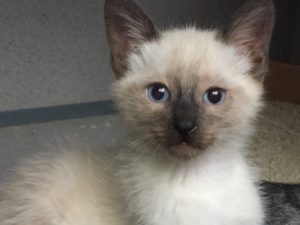Do cats get colds?
 Unfortunately, like us, our feline friends can get colds too. In fact, a cold or upper respiratory infection, is one of the most common illnesses seen in kittens. Cold are especially common in settings where many cats live together, like pet stores, shelters and breeding facilities. Like kids in daycare, kittens in pet stores or shelters are more likely to develop upper respiratory infections (URI’s) due to their naïve immune systems and their close proximity to other cats.
Unfortunately, like us, our feline friends can get colds too. In fact, a cold or upper respiratory infection, is one of the most common illnesses seen in kittens. Cold are especially common in settings where many cats live together, like pet stores, shelters and breeding facilities. Like kids in daycare, kittens in pet stores or shelters are more likely to develop upper respiratory infections (URI’s) due to their naïve immune systems and their close proximity to other cats.
What is a URI?
Upper respiratory infections are infections of the nose, pharynx, and larynx caused by either viruses or bacteria. The most common viruses are calicivirus and herpes, and the most common bacteria are mycoplasma, chlamydia and bordetella species. Several of these agents are spread through a process known as aerosolization. When a sick cat sneezes, countless minute droplets containing the infectious agents are released into the air. These droplets are small enough that they can remain airborne for extended distances and can infect cats some distance away. It is easy to understand why upper respiratory infections can spread so quickly in large cat populations. It only takes one sick cat to spread an upper respiratory infection throughout the entire cat population. Infections can also spread through direct contact, or indirectly through fomites. Fomites are inanimate objects that spread disease when they become contaminated and covered with infectious agents. Examples of fomites are bedding material, towels, or food bowls. It turns out that your mother was right when she reminded you to cover your nose when you sneeze and told you to wash your hands with soap!
Signs and Symptoms of a Cold
Most cats will only develop mild symptoms, such as sneezing, a runny nose, and watery eyes, which often resolve without any treatment. Vulnerable cats, such as the very young, very old, or already sick, can develop more severe infections. Cats with severe upper respiratory infections may develop a fever, thick, yellowish nasal or eye discharge, loss of appetite, dehydration and may become lethargic.
Treatment
Treatment of upper respiratory infections depends on the severity. Although the symptoms are annoying, many mild uncomplicated URI’s are self-limited, and like the common cold, they often resolve without any treatment. More severe infections may require oral antibiotics and/or eye medications depending on the primary symptoms. Cats that are not eating or drinking may also require additional treatments like subcutaneous fluids, appetite stimulants and even hospitalization. The best way to determine what treatment your particular cat needs is to call your veterinarian. Based on your cat’s signs and overall condition your veterinarian will determine whether your cat needs to be examined right away and whether they need medications.
For more information about upper respiratory infections and ways to prevent them speak with your veterinarian.









